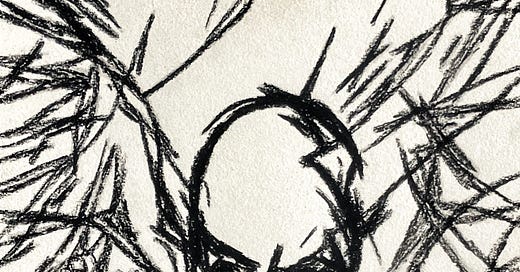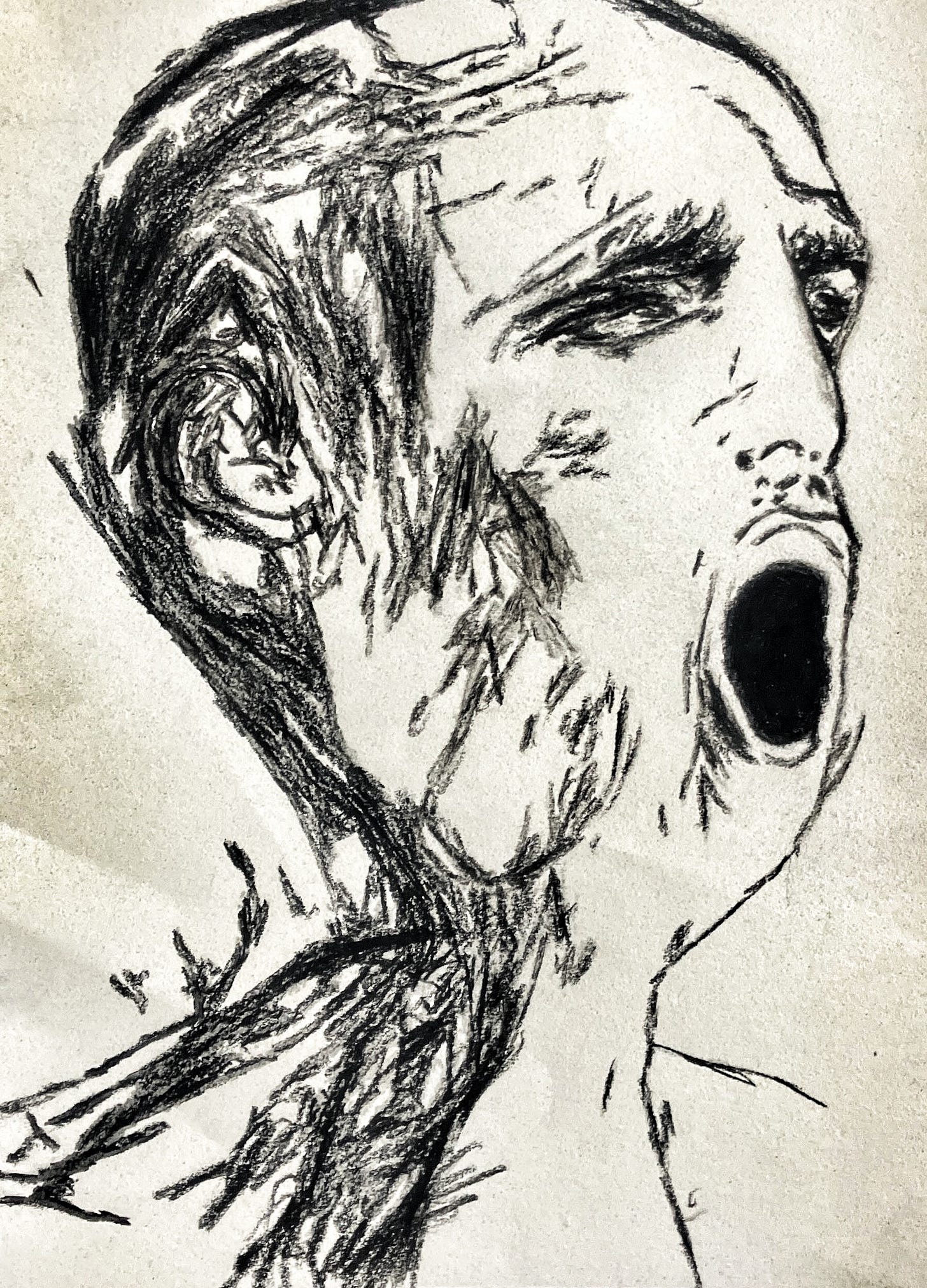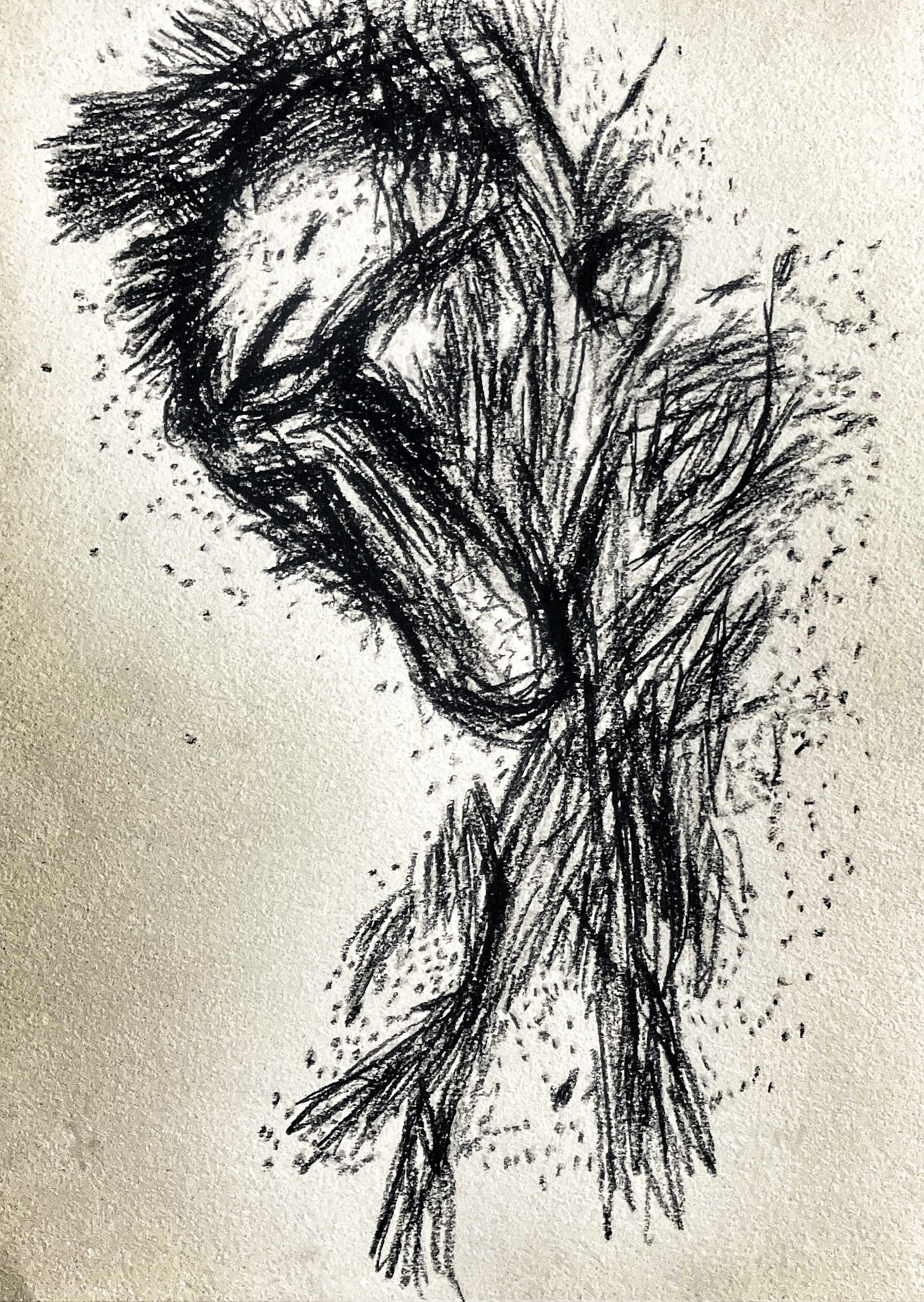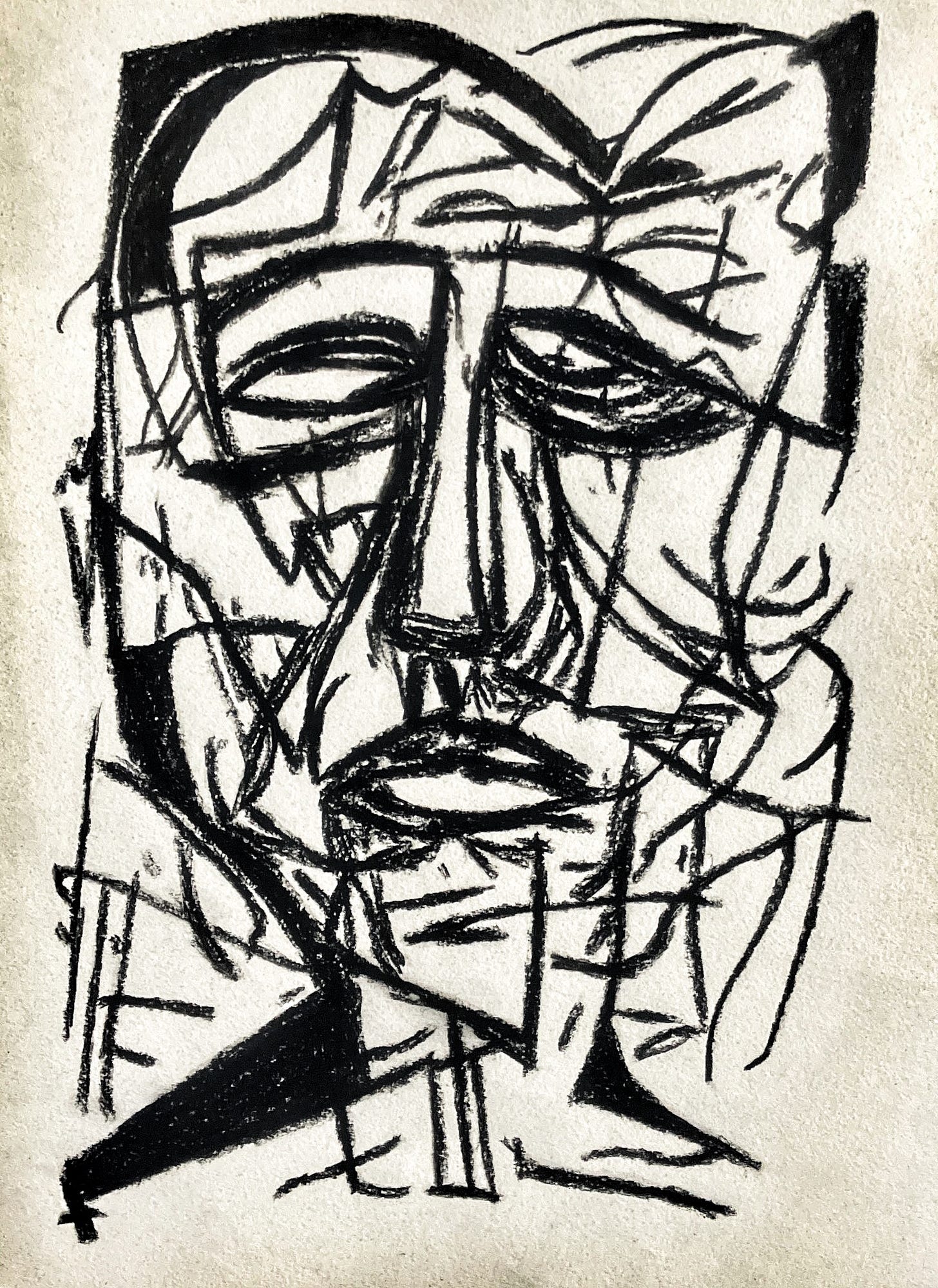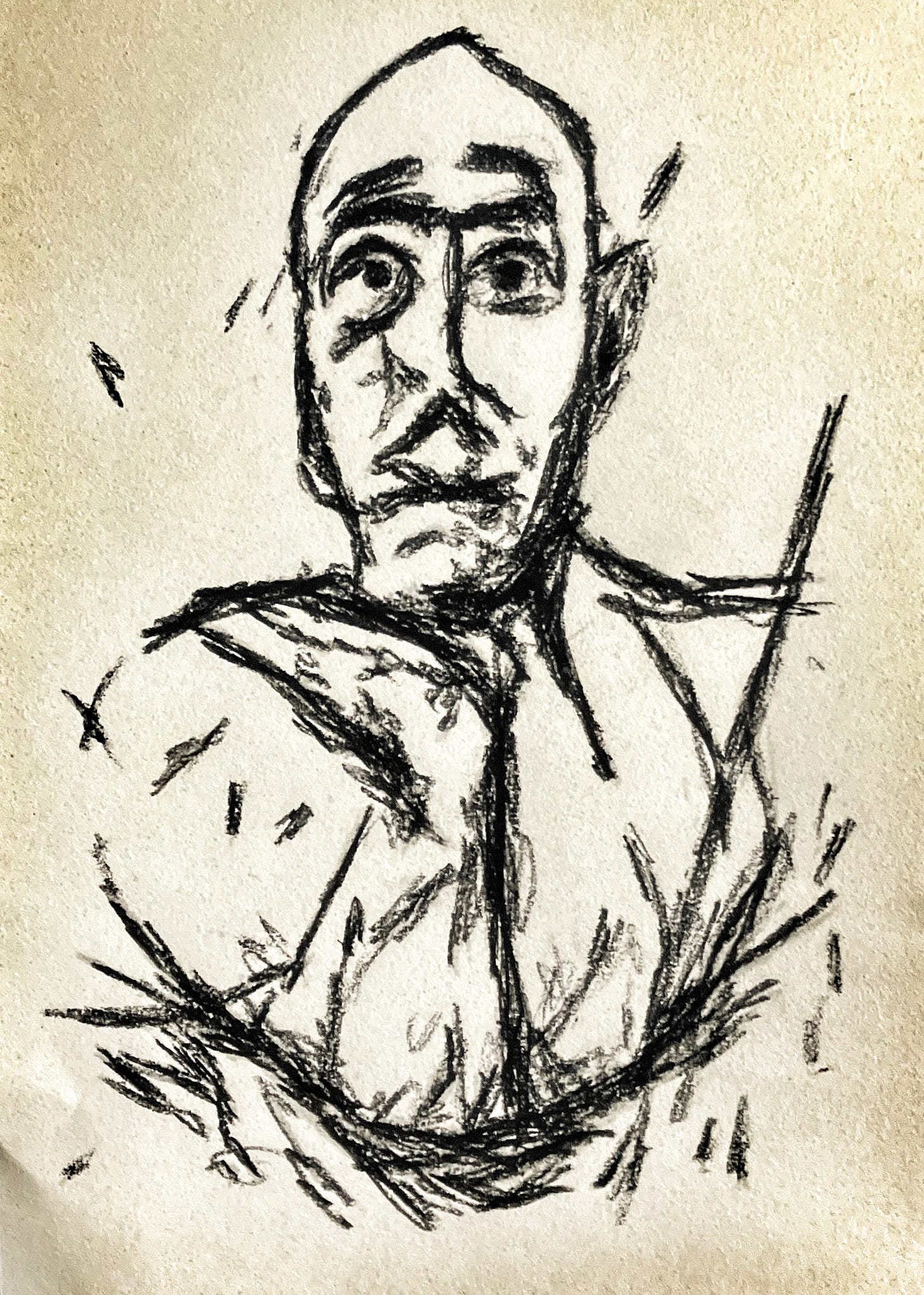No. 3: Talking about mental health + first 5 sketches
Trigger Warning: Drug Use, Suicide, Schizophrenia, Anxiety, Depression.
Introduction
Hello everyone,
My brother and I, though we walked different paths in life, shared a lot in our mental health struggles. After his suicide, I've come to realize the importance of speaking openly about these often misunderstood issues.
Mental health is a daily reality for many, including my brother and me. In this post, and the ones to follow, I want to share our journey. This isn't only about remembering my brother but also about shedding light on the complexities of mental health, in hopes of helping others understand and cope better.
To give you a glimpse into his artistic world, I'm also sharing five charcoal sketches he made. Each piece, in its own way, resonates with my experiences and emotions – they're more than just art; they're fragments of a story.
This series isn't a collection of facts and experiences. It's about life, its challenges, its victories, and sometimes, its losses. It's about the quiet battles many of us face, often in solitude. By sharing our story, I hope to showcase these hidden struggles and, perhaps, make them a little less daunting for others.
This is a tale of two brothers, different yet connected, sharing a bond that mental health both tested.
My Brother's Journey with Mental Health
My brother's journey with mental health was a complex one, significantly marked by his struggle with schizophrenia. It's essential to understand that schizophrenia manifests differently in each person. While he faced this challenge, I did not share this condition.
His life with schizophrenia was a series of ups and downs. When he was consistent with his medication, it was like having my brother back – engaged, capable, and creative. He could hold down a job and was productive, which is a crucial point to understand: mental illness does not exclude you from living a functional, successful life.
However, there were also times when he chose to stop his medication, sometimes turning to self-medication with street drugs. He suffered from dellusions, thinking at times that he doesn’t have schizophrenia and that heroin could help his other mental problems.
It's a difficult reality to accept, but one that underscores the importance of proper treatment and support in managing mental health conditions.
Tragically, my brother's journey with mental health culminated in him taking his own life. This heartbreaking outcome is a reminder of the potentially severe consequences of mental health disorders when not adequately addressed.
His suicide left a void in our lives, but it also reinforced my resolve to share our story, to raise awareness about the mental health.
The Complexity of Mental Health Disorders
Both my brother and I dealt with mental health issues, but they manifested in different ways for each of us. His main battle was schizophrenia, a condition that shaped much of his life in ways that were both challenging and unique. On the other hand, my struggles were with ADD (Attention Deficit Disorder) and GAD (Generalized Anxiety Disorder) – conditions I still manage to this day – and that I will have to manage until the day I die.
It's important to understand that mental health disorders often don't exist in isolation. My brother's schizophrenia was one aspect of his mental health, but it was intertwined with other challenges, like his periods of depression and anxiety. Similarly, my ADD and GAD often overlapped, affecting various aspects of my life, from work to personal relationships.
This complexity is something that's not always easy to grasp. Many times, people tend to oversimplify mental health issues, not recognizing the ways they can present themselves. In our case, while we shared some common symptoms like anxiety and difficulty focusing, the way we experienced and coped with these symptoms was different.
After discovering my brother’s brother's art, especially his charcoal sketches, I can see how they reflect this complexity. Some pieces were chaotic, almost turbulent, possibly mirroring his inner turmoil. Others were more structured, showing the times when he felt more in control. Looking at these sketches now, I see a visual diary of his mental health journey.
Understanding the multifaceted nature of mental health disorders is crucial. One person that has “mental health problems” can have a COMPLETELY different experience to another person with “mental health problems.”
The Stigma and Misconceptions
One of the toughest battles in dealing with mental health, both for my brother and myself, has been facing the stigma and misconceptions that often come with these conditions. Schizophrenia, for instance, is frequently misunderstood. There are so many myths about it being synonymous with violence or split personalities, which is far from the truth. This stigma not only affected how others saw my brother but also how he viewed himself.
Similarly, with ADD and GAD, the misconceptions are different but equally damaging. People often dismiss ADD as a lack of discipline or just being distracted, not understanding the constant internal struggle it involves. GAD is sometimes seen as just being overly worried, without realizing the deep, often paralyzing, anxiety it can cause.
This stigma can create an environment where people are afraid or ashamed to seek help. I remember my brother hesitating to talk openly about his condition, fearing judgment or misunderstanding. I too have had moments of reluctance, worried about being labeled or not taken seriously. Embarassed because I couldn’t attend a social outing because I had a panic attack that day.
The reality is that mental health disorders are just that – health conditions. They deserve the same level of understanding, compassion, and medical attention as any physical problems. Breaking down these stigmas is important to us. Maybe it starts with conversations like these, where we openly share our experiences and challenge the myths surrounding mental health.
The Importance of Professional Help and Support
If there's one thing I've learned from both my and my brother's experiences, it's the critical importance of seeking professional help and support for mental health issues. For my brother, proper medication and therapy was a key element in managing his schizophrenia. When he was consistent with his treatment, the difference was clear – he was more himself, more in control of his life. The times he chose to stop taking his medication or self-medicate with illicit drugs, the negative impact was extreme.
For me, managing ADD and GAD has also been a journey of professional support. Regular therapy and medication have been integral to maintaining my mental health. It's been a process of understanding my conditions, learning strategies to cope, and recognizing when to seek help.
What worked for me might not work for someone else. The key is to find the right combination of treatments and strategies that work for you, which can only be done with the guidance of mental health professionals.
It's also important to have a support system. Friends, family, support groups – these networks can provide invaluable help and understanding. However, the foundation should always be professional advice and treatment. Self-medication, especially with substances like street drugs, is dangerous and counterproductive. It's a lesson that came at the highest cost in my brother's life.
Our Shared Experiences: ADD, GAD, and Depression
While my brother's primary struggle was with schizophrenia, we both shared experiences with other mental health challenges, namely ADD (Attention Deficit Disorder), GAD (Generalized Anxiety Disorder), and depression. These conditions, though common in diagnosis, manifested in our lives in unique and personal ways.
For me, ADD often meant a constant battle for focus and organization. It wasn't simply about getting distracted; it was about how my brain processed information, often feeling overwhelmed in environments with multiple stimuli. I also struggled with perfectionism because of it.
GAD brought its own challenges, with a persistent undercurrent of anxiety. Often it was a more pervasive, generalized feeling, making even everyday tasks feel difficult. My GAD came with panic attacks that included derealization, depersonalization, and selective mutism.
Depression was another common ground between us. It's a misconception that depression is about feeling sad. It is more about a profound sense of emptiness and a lack of meaning in life, a weight that could make the simplest activities feel impossible.
My brother experienced these conditions alongside his schizophrenia, creating the complexity of mental health challenges. I feel his art often reflected these inner battles – the chaos of ADD, the tension of anxiety, and the somber tones of depression.
Remembering the Individual Beyond the Illness
In remembering my brother, it's important to me to emphasize that he was so much more than his mental health struggles. He was a person with dreams, talents, and a unique perspective on the world. His condition was a part of him, but it didn't define his entire being.
As we now discovered, he had a passion for art, which was evident in every stroke of his paintings and sketches. His creativity wasn't just a hobby; it was a way for him to express himself, to communicate in ways words couldn't always capture. His art was a window into his soul, revealing layers of emotion and thought that he most likely kept to himself.
He had a sense of humor that could light up a room, and a curiosity about the world that was insatiable. He loved exploring new ideas, whether it was through books, movies, or deep conversations. There were so many facets to his personality, each adding to the complexity of who he was.
As for me, dealing with ADD and GAD, I've also strived to ensure these conditions don't define my entire existence. They are parts of my life, but they aren't the entirety of it. I have my passions, my strengths, and my dreams, just as my brother did.
It's important when talking about mental health to remember that we're talking about people, not diagnoses. Each person dealing with a mental health condition has a story, a personality, and a life beyond their disorder.
A Call for Compassion and Understanding
As I share these insights and experiences, both mine and my brother's, my hope is to foster a greater sense of compassion and understanding around mental health. It's a topic that touches many lives, often remaining shrouded in misconceptions and stigma.
I encourage everyone to approach mental health with an open heart and mind. It's not always easy to see the struggles others are going through, especially when they're internal battles like anxiety, depression, or schizophrenia. But a little empathy can go a long way. It can be the difference in helping someone feel seen and understood rather than isolated.
If you know someone dealing with mental health issues, offer your support. Sometimes, it's as simple as listening without judgment or being there for them. And if you're the one struggling, know that it's okay to ask for help. Reaching out to a mental health professional can be a significant first step towards understanding and managing your condition.
One thing I want to emphasize - therapists REALLY do know what they are doing. They changed my life.
Disclaimer
I want to make something clear: the stories and experiences I've will be sharing throughout this newsletter are deeply personal and reflective of my own and my brother's journeys. However, it's important to remember that I am not a mental health professional.
This post is intended to share my story and raise awareness about mental health, not to diagnose or prescribe solutions. My hope is that by opening up about these personal experiences, I can contribute to a broader conversation and understanding of mental health issues.
If you or someone you know is struggling with mental health issues, I strongly encourage seeking advice from qualified mental health professionals. They are equipped with the knowledge and expertise to provide appropriate care and treatment.


